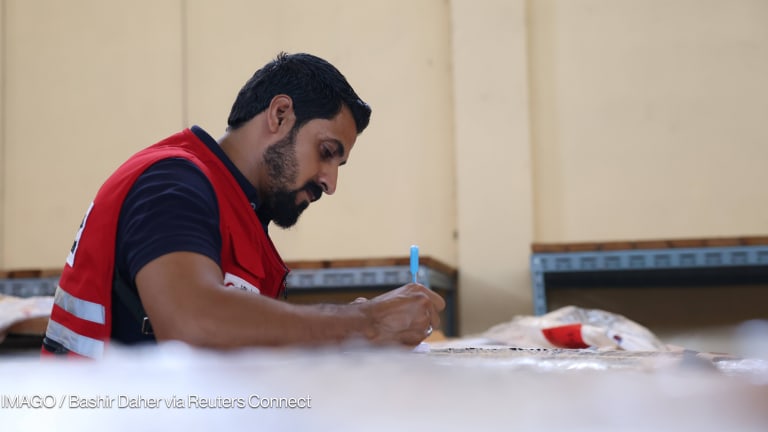Opinion: US success in humanitarian response demands a bold vision
Strong humanitarian capacity at the U.S. State Department is both a strategic and moral imperative. Here are essential components to maintain a robust U.S. humanitarian program.
There will always be a need for the United States to provide humanitarian assistance. This need arises from national security and foreign policy drivers, but also from — yes — a fundamental American moral imperative. Whether to stabilize in a fragile setting, help responsibly manage possible migration following a natural disaster, prevent mass starvation, slow the spread of an infectious disease, or lessen disruptions to American business markets and supply chains, having a strong U.S. humanitarian response architecture is securely in America’s interest. As humanitarian responsibilities shift from USAID to the State Department, we have a unique opportunity to rethink the system and create a new architecture that is smart and efficient. Below are nine key features to help ensure the U.S. has a robust humanitarian capacity. “Turning programs on and off, as was recently done, damages fragile cooperation, increases costs, slows responses, and intensifies suffering. … Continuity and reliability must be reestablished immediately.” --— 1. Create one single, Senate-confirmed official This position must have clear authority and accountability for overseeing all U.S. humanitarian efforts. Regardless of the degree that implementation may be delegated, the new structure must ensure coherence across regions, alignment to U.S. policy, and strategic decision-making on the trade-offs required in a resource-constrained environment. 2. Deliver assistance within humanitarian principles Once the U.S. has decided to assist, our aid must be rooted in the principles of humanity, impartiality, neutrality, and independence. Doing so helps ensure safe access, protect aid workers, preserve civilian dignity, and maintain U.S. credibility and diplomatic leverage, while also ensuring that humanitarian assistance does not become a weapon of war and humanitarian players do not become targets. 3. Provide flexible funding A hallmark of the gold-standard humanitarian response of the U.S. is our ability to act quickly and adapt to evolving crises, whether it’s a flooded nuclear reactor, a novel disease outbreak, or a mega-tsunami. The U.S. Congress must continue to provide funding with maximum flexibility: no earmarks, no expiration, and continued inclusion of “notwithstanding” authorities that enable bypassing many legal and regulatory hurdles when necessary. (One exception is predictive analytics and risk reduction — see below.) 4. Invest in prediction and risk reduction Humanitarian response is often dominated by the “tyranny of the urgent,” but proactive investments save lives and money. Congress should earmark at least 5% of humanitarian resources for predictive analytics and risk reduction. Early-warning systems for disasters, climate trends, and disease outbreaks must be maintained and improved. Known risks can be mitigated. Without dedicated funding, the urgency of current crises will eclipse cost-saving prevention and prediction efforts. 5. Reestablish a cadre of humanitarian experts A cadre of humanitarian experts within the State Department can assess needs, design responses, and avoid costly, even deadly, mistakes that can result from ad hoc staffing or “learning on the job.” Humanitarian relief is not a skill that can be quickly and easily picked up on the fly. Without a complete complement of dedicated staff of sufficient size and experience — including some form of Disaster Assistance Response Teams, or DARTs — we risk being ill-informed and ill-prepared as we strive to meet fast-moving crises. 6. Pre-position grants and contracts To offset greatly reduced staff capacity, it is critical that the U.S. immediately establish a network of prequalified partners — at the global level — already present in-country or capable of deploying quickly. In addition, a capacity to rapidly fund new and local partners to address unforeseen needs and continue localization efforts must be reestablished. 7. Ensure continuity and reliability Relief efforts, particularly in protracted and conflict-induced crises, require building the trust of local communities. This trust is very fragile. Turning programs on and off, as was recently done, damages fragile cooperation, increases costs, slows responses, and intensifies suffering. It can also undermine the confidence of strategic allies in their relationship with the U.S. Continuity and reliability must be reestablished immediately to minimize damage and enable better programming going forward. 8. Formalize capacity for humanitarian diplomacy Responses to the majority of large-scale humanitarian crises benefit from — and often require — well-informed and dedicated diplomatic actions at the local, national, regional, and even global levels. While the U.S. has always engaged in these efforts, moving humanitarian assistance to the State Department affords the opportunity to establish a formalized process and embedded staff that can master this critical and specialized function for maximum U.S. impact and influence. 9. Encourage and ensure resources for multilateral responses The U.S. should not respond alone or bear all the costs or risks. The United Nations, the International Committee of the Red Cross and Red Crescent, and other multilaterals have unique capacities such as the ability to involve other country donors in responses, enhance coordination, and efficiently provide cooperative logistics at scale. They also can often better engage combatants, nonstate players, and hard-to-access government authorities. US success in humanitarian response demands a bold vision The decision to restructure how the U.S. delivers humanitarian assistance will have consequential impacts for years to come. Done well, it will ensure our country is equipped to meet the humanitarian challenges of the 21st century — rapidly, intelligently, and with the credibility and compassion the world expects of us. But success depends on more than just shifting boxes on an organizational chart. It demands a bold vision, principled leadership, and meaningful investments in the systems, people, and partnerships that make humanitarian action possible. The world is watching. Let’s get this right.
There will always be a need for the United States to provide humanitarian assistance. This need arises from national security and foreign policy drivers, but also from — yes — a fundamental American moral imperative.
Whether to stabilize in a fragile setting, help responsibly manage possible migration following a natural disaster, prevent mass starvation, slow the spread of an infectious disease, or lessen disruptions to American business markets and supply chains, having a strong U.S. humanitarian response architecture is securely in America’s interest.
As humanitarian responsibilities shift from USAID to the State Department, we have a unique opportunity to rethink the system and create a new architecture that is smart and efficient. Below are nine key features to help ensure the U.S. has a robust humanitarian capacity.
This article is free to read - just register or sign in
Access news, newsletters, events and more.
Join usSign inPrinting articles to share with others is a breach of our terms and conditions and copyright policy. Please use the sharing options on the left side of the article. Devex Pro members may share up to 10 articles per month using the Pro share tool ( ).
The views in this opinion piece do not necessarily reflect Devex's editorial views.
Jed Meline is the director of policy and advocacy at Project HOPE and previously served as the director for health and humanitarian assistance at the National Security Council and as a deputy assistant administrator for humanitarian assistance at USAID.
Marcia Wong is a former deputy assistant administrator for humanitarian assistance at USAID and previously a U.S. State Department senior foreign service officer.









